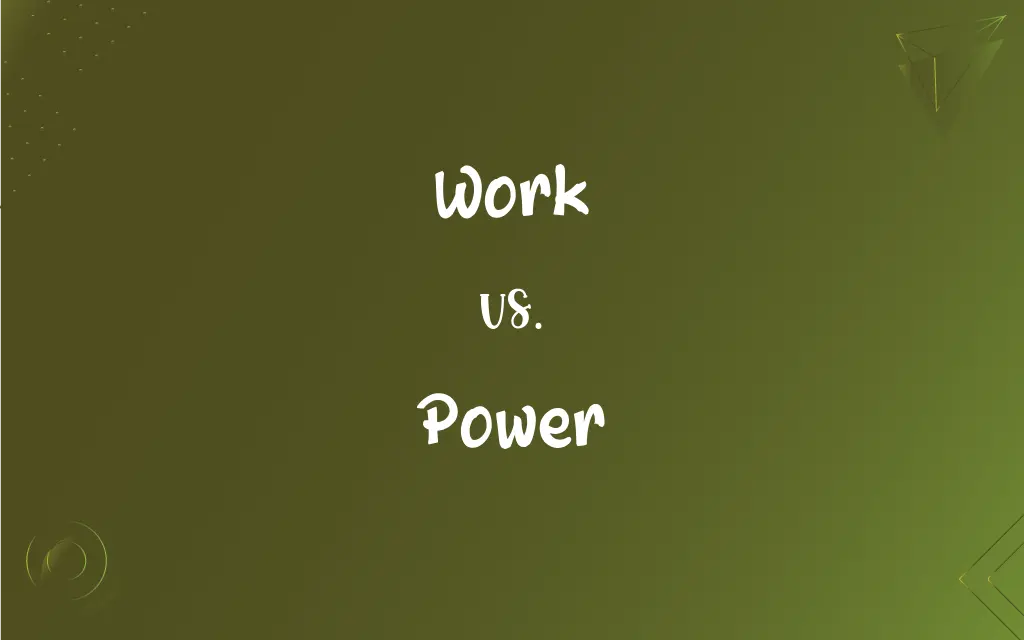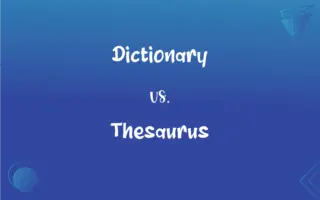Work vs. Power: What's the Difference?
Edited by Aimie Carlson || By Harlon Moss || Updated on October 23, 2023
Work is energy transferred due to force over distance; power is the rate at which work is done.

Key Differences
Work and power are fundamental concepts in physics. Work pertains to the energy transferred when a force causes a displacement. It's calculated by multiplying the force applied to an object by the distance over which that force acts. On the other hand, power refers to the rate at which work is done or energy is transferred. It's essentially a measure of how quickly energy is used or produced.
In the realm of mechanics, work and power can be visualized in various scenarios. Imagine pushing a heavy box across a floor. The energy you expend in moving the box is the work you've done. Now, consider pushing the same box but in half the time – you've done the same amount of work but at a faster rate, which means greater power.
From a unit perspective, work and power differ too. Work is measured in joules (in the International System of Units), which equates to a force of one newton over a distance of one meter. Power, conversely, is measured in watts, where one watt equals one joule per second. Thus, a machine that does 100 joules of work in 5 seconds is exerting a power of 20 watts.
In everyday contexts, both work and power find various applications. For instance, when we refer to fuel consumption in cars, we often consider the power output of the engine – how quickly it can do work. Conversely, when evaluating the effort needed to complete a task, like climbing stairs, we consider the work involved.
While both work and power are integral to understanding energy dynamics, they represent different facets. Work encapsulates the total energy transferred due to a force, while power elucidates on the speed or efficiency of that energy transfer.
ADVERTISEMENT
Comparison Chart
Definition
Energy transferred due to force over distance.
Rate at which work is done or energy transferred.
Formula
Work = Force x Distance
Power = Work / Time
Units
Joules (J)
Watts (W)
Depends on
Force and displacement
Work and the time taken
Contextual Meaning
Task or activity performed
Ability or capacity to do something
ADVERTISEMENT
Work and Power Definitions
Work
Artistic or literary production.
Shakespeare's Romeo and Juliet is a classic work of literature.
Power
Mathematical notation indicating the number of times a number is multiplied by itself.
In 2^3, 3 is the power.
Work
Exertion or effort directed to produce something.
It took a lot of work to organize the event.
Power
Rate of doing work or transferring energy.
The engine's power determines the car's speed.
Work
Force exerted over a distance.
Lifting a box requires work against gravity.
Power
A source of energy used to provide light, heat, etc.
The city lost power during the storm.
Work
The result of exertion, labor, or activity.
The sculpture is a work of genius.
Power
Capacity or ability to direct or influence others.
The president holds significant power.
Work
Task or duties performed as part of a job.
The construction workers completed their work ahead of schedule.
Power
Physical might or strength.
He showcased his power during the weightlifting competition.
Work
Physical or mental effort or activity directed toward the production or accomplishment of something
Cleaning the basement was a lot of work.
FAQs
What is work in physics?
Work is the energy transferred when a force causes a displacement.
What does power measure in terms of energy?
Power measures how quickly energy is used or produced.
Can you do work without exerting power?
No, power is the rate at which work is performed, so if work is done, power is exerted.
How is work measured?
Work is measured in joules (J) in the International System of Units.
Is horsepower a measure of power?
Yes, horsepower is a unit used to measure power, especially for engines.
Can an object do work without moving?
No, work requires a force to cause a displacement.
Is potential energy related to work?
Yes, work done against a conservative force, like gravity, is stored as potential energy.
Is lifting a book off a table considered work?
Yes, lifting a book involves work against gravitational force over a distance.
Can power be negative?
In certain contexts, like electricity, power can have a negative value indicating a reverse flow.
Does holding a heavy object involve doing work?
Holding an object stationary does not involve work in physics, as there's no displacement.
Does the direction of force affect work?
Yes, work is the dot product of force and displacement, so direction matters.
In everyday language, how can the word "power" be used?
"Power" can refer to authority, influence, or control over others or situations.
How is power related to work?
Power is the rate at which work is done or energy is transferred.
What's the relation between kilowatts and watts?
1 kilowatt (kW) is equivalent to 1,000 watts (W).
What is mechanical advantage in the context of work and power?
Mechanical advantage allows a machine to do the same work with less input force, but might require more distance or time.
What factors affect the amount of work done on an object?
The amount of force applied and the distance over which it's applied.
If power is constant, what happens to work over time?
If power is constant, work increases linearly over time.
Is it possible for two machines to do the same work but have different power outputs?
Yes, two machines might do the same work, but if one does it faster, it has a higher power output.
How does friction impact work done?
Friction opposes motion, requiring extra work to overcome it.
How does an increase in power affect work done in a fixed time?
An increase in power means more work is done in the same amount of time.
About Author
Written by
Harlon MossHarlon is a seasoned quality moderator and accomplished content writer for Difference Wiki. An alumnus of the prestigious University of California, he earned his degree in Computer Science. Leveraging his academic background, Harlon brings a meticulous and informed perspective to his work, ensuring content accuracy and excellence.
Edited by
Aimie CarlsonAimie Carlson, holding a master's degree in English literature, is a fervent English language enthusiast. She lends her writing talents to Difference Wiki, a prominent website that specializes in comparisons, offering readers insightful analyses that both captivate and inform.































































